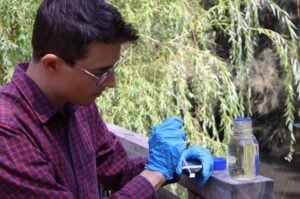Sunday, 18 January 2026
Unilever connects with Enough for sustainable plant-based mycoprotein
Plant-based mycoprotein ABUNDA is made from fungi which are highly nutritious, and have a meat-like texture, fit with The Vegetarian Butcher Unilever moves plant-based meat portfolio forward with ENOUGH Food…

Plant-based mycoprotein ABUNDA is made from fungi which are highly nutritious, and have a meat-like texture, fit with The Vegetarian Butcher
Unilever moves plant-based meat portfolio forward with ENOUGH
Food tech firm ENOUGH’s plant-based mycoprotein ABUNDA is made from fungi using a zero-waste process. It’s sustainable, highly nutritious and has a meat-like texture, making it a natural fit with The Vegetarian Butcher and future innovations across its plant-based portfolio. A key part of this involves rebalancing people’s plates from meat-centered to more plant-oriented. And that means finding good sources of plant-based proteins that are not just environmentally sustainable but appeal to consumers beyond those who follow a vegan or vegetarian diet.
Once such protein source is ABUNDA, a mycoprotein developed by food tech firm ENOUGH that uses fungi as its base ingredient.
Nutritionally, it has a lot to offer. It’s a complete protein boasting all nine essential amino acids. It’s also rich in fibre and zinc, low in saturated fat and cholesterol free.
But it’s not just its protein-rich nature that has excited The Vegetarian Butcher who have recently partnered with ENOUGH. It is also ABUNDA’s fibrous, meat-like texture and clean taste that make it ideal for making tasty plant-based foods.
“What consumers want is plant-based options that do not compromise on taste and texture,” says Hugo Verkuil, CEO of The Vegetarian Butcher, which is part of the Unilever family. “They want the same experience as they had with animal meat, without feeling any guilt about its impact on their health or on the planet.”
This appetite has seen The Vegetarian Butcher expand its portfolio to more than 30,000 retail outlets in 45 countries. And the market continues to grow at pace. Currently, meat and dairy-free alternatives are growing by 30% and by 2035 demand for non-animal protein is projected to hit 100 million tonnes.
Technology
Bringing PFAS testing to the point of need
Jan 16, 2026 | Australia
Study finds Magtein enhances memory, reaction time and heart health markers
Jan 15, 2026 | Company News
Walmart and Google turn AI discovery into effortless shopping experiences
Jan 15, 2026 | Company News
Food Testing
Bringing PFAS testing to the point of need
Jan 16, 2026 | Australia
IMCD opens a Food & Nutrition Laboratory in Cologne
Jan 08, 2026 | Company News
La Trobe University Develops Portable Biosensor to Detect PFAS in Water
Jan 08, 2026 | Australia
More Popular
Amar Pure Gold to invest Rs 250 Cr in Agro-Food Park in Himachal Pradesh
Jan 16, 2026 | Company News
Franke launches new A Line in Southeast Asia and opens regional flagship showroom in Singapore
Jan 16, 2026 | Beverages
EXBERRY plant-based colour supplier GNT earns top sustainability award
Jan 16, 2026 | Awards





